I originally had a post here that wasn’t written very well and was full of failure, so until I can properly articulate my feelings on first person shooters in general and Halo in particular, here’s a picture of my cat looking at some snow.

I originally had a post here that wasn’t written very well and was full of failure, so until I can properly articulate my feelings on first person shooters in general and Halo in particular, here’s a picture of my cat looking at some snow.

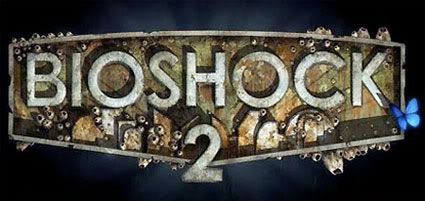
I mentioned in my review of the first BioShock that Rapture is a living, breathing entity. One of the biggest impressions made by its sequel is that the underwater city didn’t just up and disappear after the conclusion of the first game. Rapture marched on without us, and when we return to it, the city is both instantly recognizable and possessed with the feeling that something has gone horribly, horribly wrong.
…Okay, Rapture wasn’t that great a place to live to begin with, at least when we’re first introduced to it. But whereas in the first game the Splicers felt like a disorganized and individualistic mob of gibbering pseudo-zombies driven mad by their psychic powers, here they have been given purpose, direction and even promises of redemption. There are still forces struggling to control Rapture and maintain the flow of the precious material known as ADAM that functions as the life-blood of the city.
Into this volatile mix of elements comes Subject Delta, a prototype Big Daddy awakened from hibernation. Unlike the other not-so-gentle giants, Delta can use plasmids and shares a bond with a particular Little Sister. Like Jack, the protagonist of the first game, we as Delta are presented with both overarching obstacles to overcome and the means, through our choices and actions (or inactions), to change Rapture forever.
Since the introduction of Something in the Sea, I was looking forward to this release. The first game did a fantastic job building atmosphere, telling a story and actually having underlying themes and concepts that extended the game beyond yet another exercise in shooting bullets at things until they fall down. So how did the sequel fare?
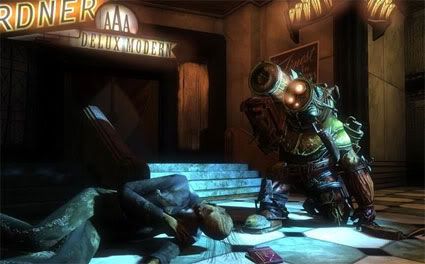
BioShock, for all of its echoes of, callbacks to and inspiration from System Shock 2, broke new ground in the realm of console shooters. Its narrative complexity, philosophical grounding and unique aesthetic set it head and shoulders above others in the genre, most of whom are trying to capture the money-making magic of Halo. BioShock 2 feels much less innovative. While there isn’t anything wrong with taking what worked in a successful title and attempting to improve it, the feeling that we’ve been here before can water the enthusiasm of the player somewhat. The first half of the game, beyond the novelty of Delta’s abilities as a Big Daddy, feel awfully similar to most of the preceding title. There’s something about the story’s structure and pacing that feels somewhat “safe”, at least at first. It’s difficult for me to fully articulate why this bothered me. Reinventing the wheel isn’t necessary when making a sequel, after all.
Anyway, the only thing persistent from the first game that really continued to bug me as I played was the knowledge that what Yahtzee calls “that side-tracking shit” was going to get pulled on me any time the objective at hand seemed simple to complete. In fact, my wife and I both quoted the Zero Punctuation review of BioShock many, many times as I played through. The main antagonist in BioShock 2 is female which makes it feel even more like she’s SHODAN with skin on. Again, this is a minor complaint, and to be honest it’s really the only complaint I can make.
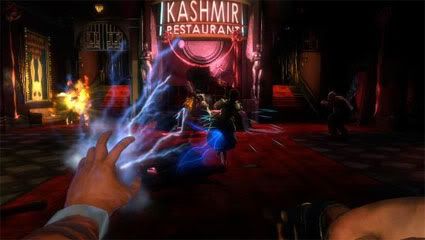
So I dove into the multiplayer that I spent some time saying we didn’t need and I’m ambivalent about it. I don’t love it but I’m also a bit surprised in that I don’t loathe it. As much as I appreciate its attempt to mix up the online shooter formula with trials, unlockable loadouts & items and something that vaguely resembles a story available through your apartments’ radio announcements and audio logs, it’s still an online shooter. There’s some fun to be had as you combine plasmids with firearms and especially when you stumble across a Big Daddy suit, but I stand by my initial feeling that it’s a little tacked on.
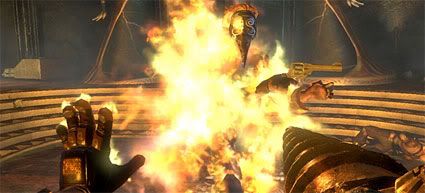
First of all, you’re a Big Daddy. You’re a towering, ponderous, super-strong giant in an armored diving suit and your melee weapon of choice is a huge drill. There’s nothing about this concept I don’t like. Now, if you’ll recall, in the first BioShock Big Daddies can be taken down by either our silent protagonist or a mob of Splicers. What differentiates you from those other unfortunate Big Daddies is the fact you have (at least I’m hoping) a functional frontal lobe. Tactics actually come into play in this game beyond “chase down the bad guys and set them on fire”, which is something I’ll discuss in the next section.
The slight changes to the weapons loadout work well. Having the drill & rivet gun definitely add to the “You’re a Big Daddy now” feeling, and wielding a double-barreled shotgun made me wonder how Bruce Campbell would fare in this situation. A chainsaw isn’t that far removed from a drill, after all. Anyway, there’s also the fact that you can use your plasmids at the same time as your other weapons, which not only saves time in switching from one to the other but also allows for some of that creative thinking stuff. The game actually rewards you for being creative and switching things up with the research bonuses.
While the voice-acting isn’t quite as immersive as that of the first BioShock, it’s still quite good, especially when it comes to the characters of Eleanor and Alex. I’ll stop my train of thought at that station because I don’t want to spoil it for you. Finally, the plumbing system from the first game is replaced with a much more straightforward mini-game for hacking. Unlike the replacement systems for decryption and bypasses in Mass Effect 2, it’s far less tedious and a bit more challenging to hack something, and it’s quite rewarding when you pull a hack off while under enemy fire.
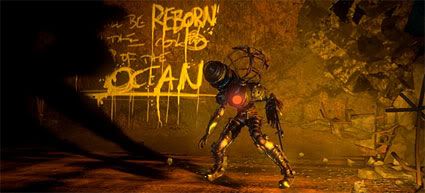
“You might stop fearing death,” said a member of TV Tropes about the games Vita-Chambers, “but that doesn’t stop you from being afraid.” No character drives this point home more than the Big Sisters. Originally planned to be a single recurring villain, the Big Sister is an extremely elite sort of antagonistic creature that really, really doesn’t like you messing with her pint-sized dress-wearing barefoot counterparts. Unlike the huge and often passive Big Daddies, Big Sisters actively seek you out, chasing you through Rapture and using combinations of lithe acrobatics, highly evolved plasmids and a wicked sword-like ADAM extraction needle to encourage you to stop. The knowledge that you can pop out of a Vita-Chamber nearby after she hands you a severe ass-kicking never stops the blood-curdling screech they emit as they track you down from being terrifying.
The game tells you to “Prepare yourself” when the Big Sister is coming for you. Thankfully you can channel your fear into those preparations by laying traps, hacking security systems and loading up on more effective ammunition. BioShock 2 rewards creative thinking, as I’ve said, and this includes setting up some very nasty surprises for enemies coming your way. Both when dealing with a Big Sister and watching over an adopted Little Sister as she gathers ADAM from a corpse, the best way to ensure your survival and conserve your resources is to examine the area, plot out possible routes of approach and trap them accordingly. The dead strewn about Rapture lets you pick and choose where your gathering operations take place, and on more than one occasion I’d come into a room with a vent and smile, because I knew exactly where I’d be meeting the Big Sister. This didn’t make the experience of fighting them less harrowing, for me, and I played on Normal difficulty. I suspect future playthroughs will have me cursing more and voiding myself less when the screaming Big Sister comes at me out of a haze of fire and terror.
This brings me to the Little Sisters.
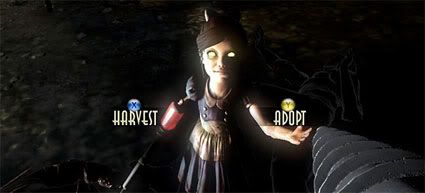
Maybe my paternal instincts kick in hardcore when I see one. Maybe the team at 2K have really made them more sympathetic over the years. Maybe I’m just a pussy. However, when the Little Sister looks up from the broken body of “Mr. Bubbles” only to smile brightly at you, and in some cases hop up and down excitedly (“Are we going to be together now, Daddy?”), there’s no way in hell I can bring myself to tear them apart for the sake of holding a flailing sea slug in my hand. And killing Little Sisters, besides guaranteeing one of the games ‘bad’ endings, would deprive you of some very funny and rather heartwarming lines of dialog.
For example, carry a Little Sister on your shoulders, then zap a Splicer with the Electro Bolt plasmid and/or pelt them with bullets from the machine gun. “Look, Daddy!” the Little Sister cries with glee. “He’s dancing!” And if you’re in the middle of a gathering operation, and one of the Splicers gets to your Little Sister, rush over with your drill in full spin. As you reduce the would-be pederast to little bloody chunks, the Little Sister proclaims “Nobody messes with my daddy!” Finally, there’s the “Daddy? You always save me from the monsters” line when you pick her up after a harrowing battle, and the very soft and heart-felt “Thank you” spoken to you after some of them crawl into their vents after being rescued.
Again, maybe it’s just me. Maybe you’ll go into this game with the intent to rip every single one of these toddling terrors to shreds. That’s your call. For me, protecting and rescuing the Little Sisters added depth to the game and really pulled me into the experience. We learn a lot more about them, what they go through in the rather horrific process that creates them and how they see Rapture. Especially after those experiences, harvesting them for their parasites rather than setting them free seems as cruel an act as anything perpetuated by the game’s villains.
BioShock 2 isn’t just BioShock with a fresh coat of paint and a few cool new weapons. It’s not entirely different, either, and if you haven’t played the first game you might feel a bit lost, confused or even disinterested. Fans of the first game are in for a treat, and while it doesn’t really push the envelope in any way, it does what the first game did very well and, in some cases, better. In a world where sequels are often an ever-extending litany of disappointments in light of the original title, BioShock 2 does what good sequels always should.
Bottom Line: You may want to play the first game before picking this one up. But even if you don’t, in my opinion, it’s worth your time, it’s fun to play and it still tells a good story that has something going on besides loud gunplay and teabagging. Buy it.
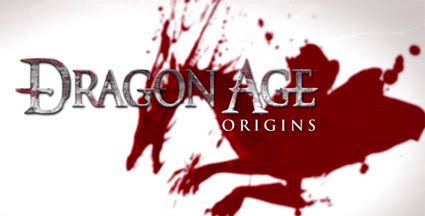
I’ve ragged a bit on the length of Dragon Age: Origins as well as the infamous memory leak that completely devoured at least an entire day of my life. But how did I feel about the game overall? How does its writing compare to Mass Effect or even its spiritual ancestor, Baldur’s Gate? Read on, and find out.
Dragon Age is a fantasy setting based in the world of Thedas. Origins introduces us to this world through the nation of Ferelden, which is facing the threat of invasion by twisted creatures known as darkspawn. The only force with the knowledge and experience capable of ending this threat, before it becomes a full-blown contagion of violence and destruction called a Blight, is the elite order of the Gray Wardens. It is this order your character will be invited to join after you get to know the race and/or class you select at the opening of the game.
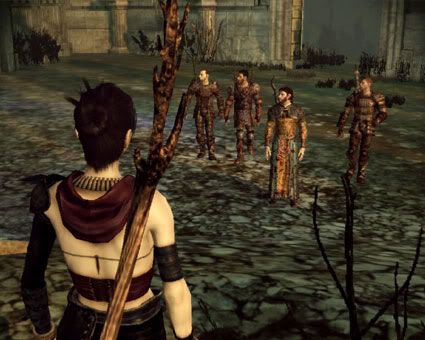
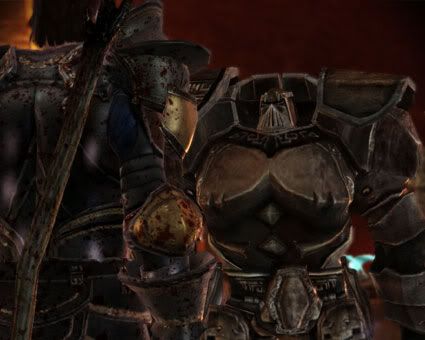
“YOU WILL GO TO THE WAYOVERTHERE MOUNTAINS, TO THE VERY PEAK OF MOUNT NOOBDEATH, AND BRING ME THE TEN HAMMERS OF AWESOMENESS TO PROPERLY DISPOSE OF THE ANVIL OF THE VOID.”
“Is the anvil bolted down?”
“…WHAT DOES THAT HAVE TO DO WITH ANYTHING?”
“Well, if isn’t bolted to the stone, why don’t we all pick it up and heave the thing into the molten lava flowing below us? Hell, even if it is bolted down, I’m a mage, Oghren’s a mighty beer-drinking dwarf, Alistair’s pretty badass when he stops whining and snarking, and both you and Shale are immortal super-strong golems. Why don’t we eliminate the bolts, THEN hurl it into the lava? That’d do the job nicely, right?”
“…YOUR SOLUTION IS NOT EPIC ENOUGH.”
“But it just makes more sense to use what we’ve got here than to wander all the way out and up into the mountains…”
“EPIC SOLUTIONS DO NOT MEAN LOGICAL SOLUTIONS. GET ON WITH THE QUESTING.”
“…”
“THERE’S EPIC GEAR IN IT FOR YOU.”
“Fine, whatever.”
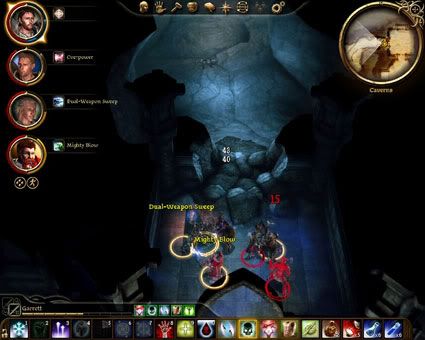
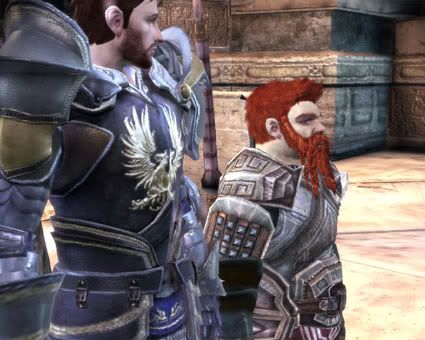
Bottom Line: If you have any interest in a high fantasy role-playing game that evokes the likes of Baldur’s Gate or Neverwinter Nights, Dragon Age: Origins is worth the investment of both time and money. Fans of straight-forward hack’n’slashers might be better off buying Torchlight or saving up for the upcoming Diablo III. I plan on playing this plenty in the weeks and months to come, which means that for me, Dragon Age: Origins is a great success.
Jaysus Begorrah, there are a lot of Mass Effect 2 reviews out there. I suppose sooner or later I’ll post one of my own, once I’m able to play the damn thing, but going with my revamped “one at a time” policy, I need to finish Dragon Age and BioShock 2 first. Which hopefully means I’ll be able to get past the final final Archdemon boss despite having been a bit helter-skelter in my Arcane Warrior build. But I digress. We’re not here to talk about fantasies today, at least not the ones in a specific Tolkienesque setting – we’re here to get our space exploration on.
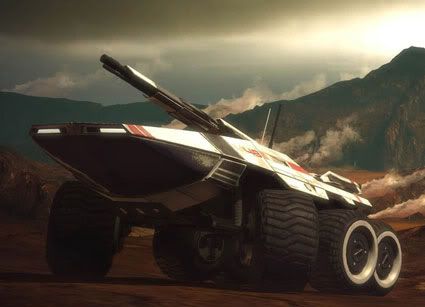
If you’ve played Mass Effect 2, you probably no longer look upon this vehicle with the usual quantity of rage reserved for its sections in the first game. I almost want to review the Mako as if it were a car on Top Gear:
The Mako has a fantastic range of armaments, able to turn a regiment of the Queen’s own armored warriors into a fine red mist in a matter of seconds. But if you actually want to close distance with your intended target, you’re in for a shock. Normally when driving an APC, you can expect a stiff, metal-cast suspension built to handle abuse. But the Mako’s suspension is apparently made from poured concrete, meaning it has a turning radius greater than some of the planets you’re about to explore.
The Mako’s not an entire loss, but it’s not exactly a joy to drive, either. However, BioWare seems to think that the Mako was an entire loss, and so gave us something new in Mass Effect 2.
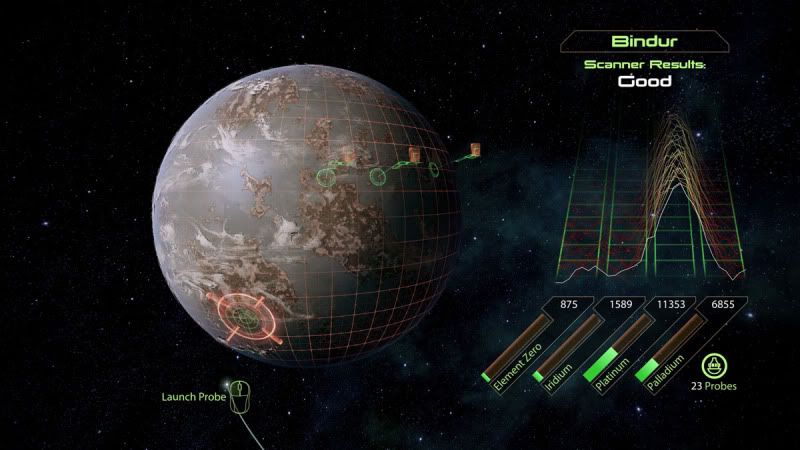
I still haven’t played the game myself, but having seen this part of it, I can see why it is one of the most universally loathed aspects of not just this game, but any game produced in recent memory. Some of the complaints about the Mako sections of the first game were their length and tedium. Scanning in the sequel takes just as long and, from what I understand, is just as tedious. Another Mako complaint is, obviously, it’s handling. So if scanning is meant to be an improvement over the Mako, the controls should handle smoothly and be a delightful diversion from ducking for cover like we’re playing Gears of War, right? Sorry, that’s not the case here. The reticle moves slowly over the surface of a world when you’re scanning, and unless you want to risk missing a particularly rich pocket of Element Zero, you need to drag it across every square mile of the planet’s surface.
Now one thing the scanning mini-game does well is convey the feeling that one is in space. And I don’t mean it hearkens to Star Trek or Battlestar Galactica. No, it hearkens more to 2001: A Space Odyssey or video recordings of NASA operations. That is to say that it’s lengthy, quiet, procedural and really rather dull. When I sit down to play this game, I’m going to have my iPod handy, and once the Normandy establishes orbit around an unexplored world, I’m going to turn on some music that’ll keep me awake while I’m scanning.
Something like this, for example.
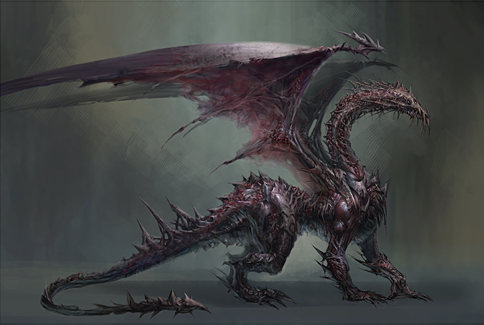
I hate Dragon Age: Origins right now.
There’s apparently a memory leak in the PC version of the game that causes load times to last longer and longer the more you play it. If you play for, say, an hour, you might not notice. But in my fervor to finish my first play-through I spent the bulk of my time this past weekend playing it, and the bulk of that time was spent looking at the spinning “loading…” graphic at the bottom of a parchment-colored screen stained with blood. I finally stopped and turned to other games in the middle of the evening yesterday, occupying myself instead with a little BioShock 2 and starting a game of Mass Effect 2.
But if I’m honest, I’m apprehensive. I want to finish Dragon Age for a variety of reasons, including posting a review here and over at the Escapist. The biggest one is something Chuck talked about this morning. Like writing projects, it’s probably best to focus on one game at a time. Of course it doesn’t help that I’m also trying to keep up with folks in Star Trek Online but that is somewhat beside my point.
I didn’t post a continuation of my Farraday fiction project because in comparison to The Project, it isn’t that important. I should probably make time to write some articles to pitch to the Escapist, but I feel that as much as I might get paid for them, it’s still taking writing time away from the aforementioned Big P. And if you look up at the little column-spanning block towards the top of this webspace, the first thing listed there is ‘aspiring novelist.’ I feel that, when I’m not distracting myself with games, carving out a little time to post here so you all don’t lose interest in me, or doing real-life things like taking my wife places or doing laundry or herding cats, I should be focused on that first and foremost.
Granted, things are still in progress with Polymancer Studios, there are a couple other things I’m waiting to hear about and I do adore everybody at the Escapist and working with them. But the fact remains that my dream has been to get a novel out to someone who can put it into print, and wandering past a bookstore to see something with my name on the cover displayed at the front of the store for people to purchase, take home and enjoy.
I’ve also dreamed of travelling to space and driving an Aston Martin, but like writing projects and games, I should take my dreams one at a time.
© 2024 Blue Ink Alchemy
Theme by Anders Noren — Up ↑